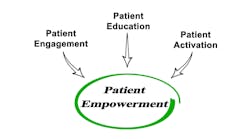How Leveraging Big Data Can Improve the Health of Clevelanders
Some of Cleveland's greatest challenges—poverty and the poor health that often accompanies it—could be solved by exploring ways to better leverage big data, according to a new report.
The Center for Population Dynamics at Cleveland State University conducted a study in which researchers recently assessed the local biomedical sector and the growth of a health-and-technology corridor on the city's East Side, according to a recent story in the Cleveland Plain Dealer.
Essentially, researchers said that Cleveland might be able to use its health care and big data expertise to better understand and address disparities that impact people's health outside of hospitals. To this end, consultants, companies and health systems then might be able to turn that understanding into a product—research and solutions to sell to other communities grappling with the same issues, the Plain Dealer report stated.
The report, “The Healing Economy: An Economic Development Framework for Cleveland,” noted that the Cleveland metro has the densest health science labor market in the nation, with 14.5 percent of the region’s workforce employed in high-skilled healthcare delivery. Cleveland is ahead of Philadelphia (14.1 percent) and Boston (14.1 percent) in this area. What’s more, a significant amount of Cuyahoga County’s healthcare jobs are clustered in Cleveland’s “health tech corridor.” In 2003, 26.4 percent of all healthcare and social assistance jobs in Cuyahoga County were in the health tech corridor, increasing to 36.2 percent by 2015.
But while Cleveland excels as a “knowledge cluster” in healthcare, the region performs less well as a “knowledge hub,” described as the region’s ability to produce life science research. Cleveland ranked 22nd nationally in R&D funding from the National Institute of Health in 2016, according to the report.
As such, the current analysis suggests state- and local-level policies should supplement seeding “downstream” innovation that facilitates start-up formation and technology transfer with the funding of “upstream” innovation that attracts “star scientists,” particularly in frontier fields, the researchers said.
One of the report’s authors wrote, "The goal here is not so much preventative medicine" and changing how people act. He said it’s "a systemic change in population health that prevents disparities by predicting them in advance of their occurring."
The report also stated, “Today, Cleveland is still economically restructuring from a secondary to tertiary economy. Yet many regions are in the midst of a second economic restructuring from secondary/tertiary to quaternary, in which economic value is the data capital derived from a good or service, rather than the good for service itself. This data capital is the ‘oil’ for the next-wave of innovation, principally in the fields of artificial intelligence (AI) and machine learning.”
The Plain Dealer interviewed a former senior executive at Explorys, a Cleveland-based healthcare analytics business acquired by IBM in 2015, who said that going forward there will be a more holistic approach to learning that there are a lot of other things that determine people's health, such as social determinants and environmental determinant. The executive added, “Health systems know about it, but the issue is getting the data…There's a lot of things that could spring out of that expertise: tech companies and data analytics. Tech products and solutions. Consulting.”
Read the whole story in the Cleveland Plain Dealer.

